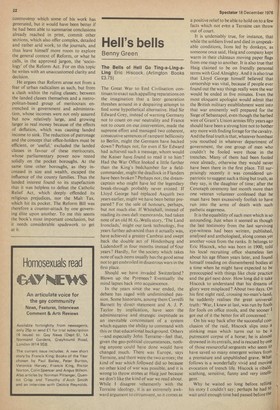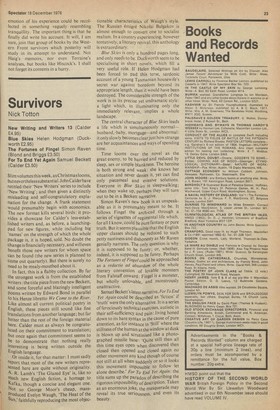Hell's bells
Benny Green
The Bells of Hell Go Ting-a-Ling-aLing Eric Hiscock (Arlington Books 0.75) The Great War to End Civilisation continues to exact such appalling reparations on the imagination that a later generation threshes around in a despairing attempt to find some hypothetical alternative. Had Sir Edward Grey, instead of warning Germany not to count on our neutrality and France not to count on our intervention, made the supreme effort and managed two coherent, consecutive sentences of rampant bellicosity to Berlin, might the Germans have backed down ? Perhaps not, for even if Sir Edward had achieved such a message, whom would the Kaiser have found to read it to him? Had the War Office looked a little further than the King's bedchamber for a fieldcommander, might the deadlock in Flanders have been broken ? Perhaps not ; the dreamcaptain who might have led the legendary break-through probably never existed. If Lloyd George had replaced Asquith two years earlier, might we have been better prepared ? For the sale of honours, perhaps, but not much else. If Whitehall, instead of reading its own daft memoranda, had taken note of an old H. G., Wells story, 'The Land Ironclads,' might our tank technology, five years further advanced than it actually was, have achieved a greater Cambrai and swept back the double act of Hindenburg and Ludendorff in four months instead of four years? Hardly, for the society which takes note of such items usually has the good sense not to get embroiled in disastrous wars in the first place.
Should we have invaded Switzerland ? Blown up the Pyrenees? Eventually the mind lapses back into acquiescence.
In the years since the war ended, the debate has raged with undiminished passion. Some historians, among them Correlli Barnett by direct statement and A. J. P. Taylor by implication, have seen the administrative and strategic ineptitude as an inevitable concomitant of a system which equates the ability to command with this or that educational background. Others —and especially John Terraine—feel that, given the geo-political circumstances, nothing anyone could have done would have changed much. There was Europe, says Terraine, and there were the two armies; the kind of war which followed did so because no other kind of war was possible, and it is wrong to throw stones at Haig just because we don't like the kind of war we read about. While I disagree vehemently with the Terraine ideology, it is an extremely awkward argument to circumvent, so it comes as a positive relief to be able to hold on to a few facts which not even a Terraine can throw out of court.
It is undeniably true, for instance, that while the soldiers lived and died in unspeakable conditions, lions led by donkeys, as someone once said, Haig and company kept warm in their châteaux moving paper flags from one map to another. It is also true that Haig claimed to be on friendly personal terms with God Almighty. And it is also true that Lloyd George himself believed that censorship was vital, because if people ever found out the way things really were the war would be ended in five minutes. Even the most eloquent apologist would admit that the British military establishment went into that war eminently well prepared for the Siege of Sebastapol, even though the barbed wire of Grant's Union armies fifty years ago should have been a strong hint not to bother any more with finding forage for the cavalry. And the final truth is that, whatever bombast you mouthed in whatever department of government, the one group of men who couldn't be fooled were those in the trenches. Many of them had been fooled once already, otherwise they would never have been there in the first place. Till surprisingly recently it was considered unpatriotic to suggest such a thing but truth, as they say, is the daughter of time; after the Cenotaph ceremony last month more than one veteran volunteer confessed that he must have been excessively foolish to have run into the arms of death with such pathetic eagerness.
It is the equability of such men which is so astounding. Just when it seemed as though the last testimony from the last surviving eye-witness had been written, published, analysed and anthologised, along comes yet another voice from the ranks. It belongs to Eric Hiscock, who was born in 1900, told his local recruiting office shameless lies about his age fifteen years later, and found himself treading on dismembered bodies at a time when he might have expected to be preoccupied with things like choir practice and the girl next door. How long did it take Hiscock to understand that his dreams of glory were misplaced ? About two days. On his first night raid, crossing no-man's-land, he suddenly realises the great universal truth : 'War, I knew at last, was run by fools for fools on office stools, and the sooner I got out of it the better for all concerned.'
On his way back after the successful conclusion of the raid, Hiscock slips into a stinking mass which turns out to be a putrescent corpse of a horse; he is almost drowned in its entrails, and is rescued by one of those resourceful sergeants who seem to have saved so many emergent writers from a premature and unpublished grave. What follows is a wonderfully vivid and moving evocation of trench life. Hiscock is ribald., scathing, sensitive, funny and very intelligent.
Why he waited so long before telling his story I couldn't say; perhaps he had to wait until enough time had passed before the emotion of his experience could be recollected in something vaguely resembling tranquillity. The important thing is that he finally did write his account. It will, I am sure, join that group of books by the Western Front survivors which posterity will study in its attempt to understand. Not Haig's memoirs, nor even Terraine's analyses, but books like Hiscock's. I shall not forget its contents in a hurry.















































 Previous page
Previous page